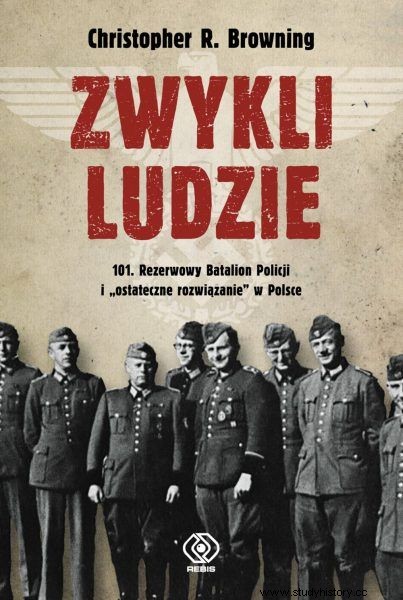They turned from ordinary people into beasts. How did the Germans manage to organize and carry out the extermination action in the vast areas of occupied Poland?
If we were to consider the history of the Holocaust concisely, briefly and from a statistical point of view, then we can say that by March 1942 about 25% of Polish Jews were murdered. Thus, the vast majority remained alive in ghettos, small towns and villages. When the front in the East stabilized in 1943, the situation changed dramatically.
The concentration camp was surrounded by electrified barbed wire, a system of punishments, apartment blocks and places of mass murder:gas chambers, crematoria ... Everything under the control of guards. However, when it comes to towns, villages and ghettos, the matter was definitely different. For the genocidal task, the Germans needed an enormous number of contractors. To this end, the 101st Reserve Police Battalion from Hamburg was created, a part of which were average Germans, people like most of the inhabitants of German cities of the 1940s . The most ordinary citizens with their habits, mentality and vices, too old to go to the front lines, but suitable to actively participate in deportation actions to the camps, and later also in the extermination of Jews. It is possible that had it not been for the war, they would never have become murderers.
Hamburg, May 1940. Railway station
The officers of the 101st Reserve Police Battalion are getting ready to leave for occupied Poland.
- I am very worried and scared for you. You're going to war
- Take it easy, don't worry. I'm going to Poland. We will quickly bring peace and order there. We will show Poles who is in charge here. After all, I'm only a policeman, I keep order. The war is far away, I'll be back soon.
This could have been the farewell of a policeman from the 101st Battalion with his wife, just before leaving for Poland. Maybe he was going with the hope of a quick return? It is possible that already at the train station he started to miss his family, German beer and wurst. After all, he was a middle-aged man, an ordinary officer. Meanwhile…
July 1942. Józefów near Biłgoraj
The 101st Reserve Police Battalion is ordered to gather nearly 2,000 Jews. This time, they are not to be transported to the camp, but to be liquidated.
Major Trapp summoned the officers and acquainted him with the order. The privates did not know the details of the planned action. Lieutenant Heinz Buchmann, entrepreneur and reserve lieutenant, stated that:
Under no circumstances will he take part in the action in which innocent women and children are planned to be shot.
The major agreed to his request and transferred him to supervise the transport. The line of policemen was also given the opportunity to resign . Twelve benefited. Major Trapp was also shaky but kept repeating: An order is an order . When Trapp was arguing with his conscience, NCOs were already preparing the policemen for action. Battalion physician Dr. Schoenfelder sketched the contours of the human body from the shoulders upwards and pinpointed the exact point at which to aim by first touching it with a bayonet.

When the first group of Jews was brought to the edge of the forest, a policeman would approach each of them and lead them deeper into the forest. There, sergeant Kammer ordered the Jews to lie down in a row, and each policeman, as instructed, shot in the neck . The situation repeated, the murderers lost track of time and the count of the murdered. The next morning, Major Trapp gave them the option to opt out of the action. A dozen have stepped out of line. In time, another small group approached Kammer with a request to exempt them from the task. Some of them also tried to avoid shooting on their own. But most did as ordered . After killing all the Jews, the battalion returned to Biłgoraj. The vodka was flowing freely and Trapp, by soothing his value system, blamed the system.
How is it possible that of the five hundred ordinary, sedate men assigned to action, only twelve, immediately upon hearing the command, asked for a change of tasks? Can their decision be justified by "orders" that are difficult to stand up to? Or maybe belonging to a group and fear of its reaction to refusal, to weakness? Is the social system dysfunctional? Some justified themselves with the fact that, according to the Nazi doctrine, the Jews would be liquidated sooner or later.
Regardless of whether someone refused to complete the task or not, the crime in Józefów left its mark on the entire battalion. The atmosphere after the execution is quite well described by the sentence uttered by Sergeant Kammer: I will go mad if I have to do it again . However, time heals all wounds and when it comes to the next tasks, the 101st Reserve Police Battalion (without the men who were sent earlier to other activities) started to act, becoming a ruthless and efficient machine of cruelty.
And Józefów was only a prelude to mass extermination.
Source:
Trivia is the essence of our website. Short materials devoted to interesting anecdotes, surprising details from the past, strange news from the old press. Reading that will take you no more than 3 minutes, based on single sources. This particular material is based on the book:
- Christopher R. Browning, Ordinary People. 101st Police Reserve Battalion and the 'Final Solution' in Poland, Rebis 2019.
